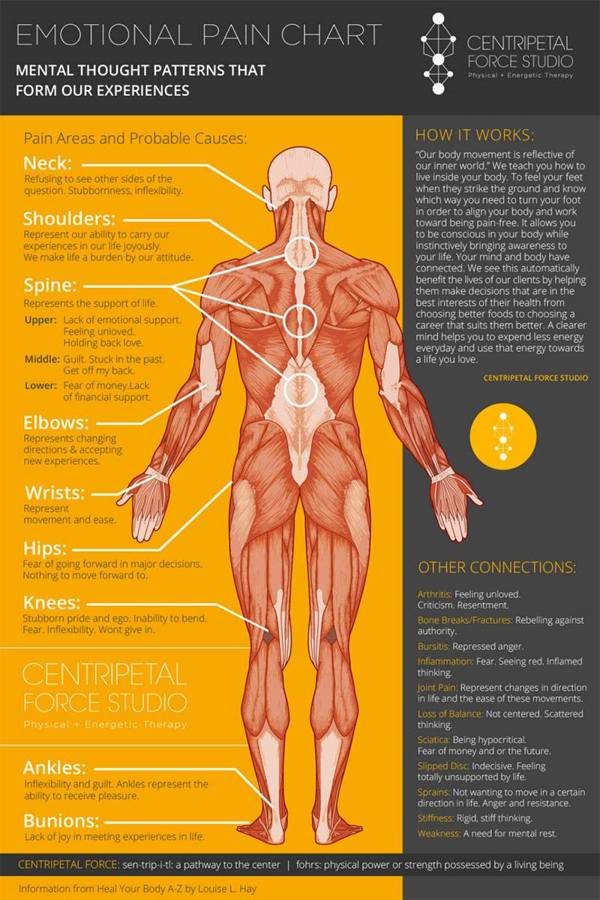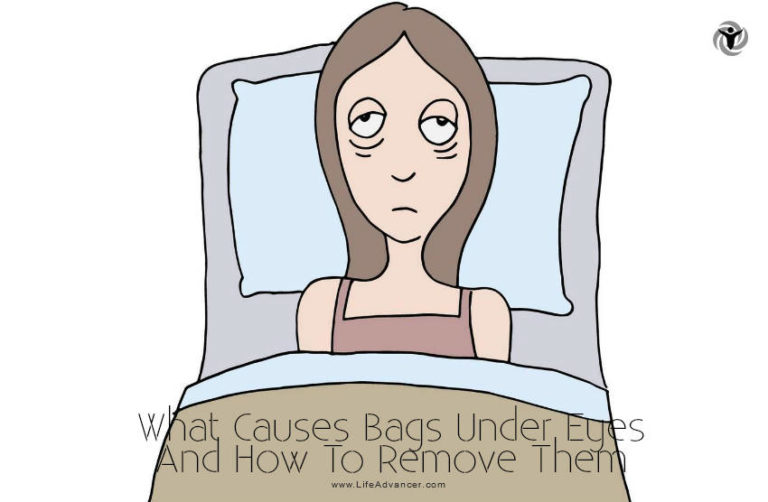This emotional pain chart will show you how your body reacts to your negative emotions.
We experience an array of emotions every day – anything from happiness to sadness to extreme joy and even depression.
Our body responds to the way we think, feel, and act. This is one type of “mind/body connection.” Each emotion creates a different feeling within the body: it releases different chemicals when we experience various things that make us happy or upset. Each chemical works to create a different environment within the body.
For example, when your brain releases serotonin, dopamine or oxytocin, you will feel good and happy. Conversely, when your body releases cortisol while you are stressed, you will have a totally different feeling. Let’s take a closer look and see what our emotions can actually do to us.
Our brain is extremely powerful and complex
It affects our body based on what it is feeling. The mind and the body are linked, which can’t be seen, but only felt. The quality of the emotional signal that ‘the heart’ sends to the brain determines what kind of chemicals are released into our bodies and when we experience negative emotions, the signal sent to the brain mirrors our feelings.
While negative emotions are completely natural, they are still some of the most toxic emotions that we can have. Feelings of rage and hatred build up in the mind, body, and soul, affecting the body’s organs and natural processes and breeding more negative emotions and leading to depression.
Prolonged bouts of anger and negativity can take the toll on the body in the form of high blood pressure, stress, anxiety, headaches, and poor blood circulation. Some researches also show that even one five-minute episode of anger is so stressful that it can damage your immune system for more than six hours! In turn, all of the health issues mentioned above can lead to even more serious problems such as heart attacks and strokes.
One scientific study said that the molecules accumulated and exhaled while you verbally express anger, hatred or jealousy, contain toxins that, when collected for about an hour, are enough to kill eighty guinea pigs…
Also, when we are feeling stressed, anxious, or upset, we may not take care of our health as well as we should. We often do not feel like exercising, eating nutritious foods or even taking prescribed medications. Abuse of alcohol, tobacco, or other drugs may also be a sign of poor emotional health.
The 10 most common negative emotions are:
- Anger
- Sadness
- Jealousy
- Hatred
- Grief
- Isolation
- Humiliation
- Worthlessness
- Anxiety
- Conflict
See this emotional pain chart (infographic) from cforcestudio.com:

So, how do you overcome all the negative emotions and stay happy and healthy?
There are many techniques to help us deal with negative emotions and a lot of books, articles, seminars, and films have been created to explain the importance of this issue.
Here are 5 tips that are most effective under any circumstances.
1. Cutting perceptions as much as possible.
After thinking about the negative for a moment you might realize that there are in fact no positive or negative experiences other than what we define as such. Therefore, our perception of an experience or situation has the ultimate power as to how we will feel when it’s happening and how our bodies will be affected.
2. Acknowledging anger.
Instead of pushing your anger into the recesses of your mind or refusing to admit it is there, be mindful of what you are feeling. If you can admit that you are angry, then you can begin to tackle those emotions and find a solution to the problem.
3. Taking control of your thoughts.
It can be difficult to change your way of thinking from negative to positive. A lifetime of habits is a massive obstacle to overcome. Does that mean it’s impossible? Absolutely not! Whether you are 20, 50, or 90 years old, it is never too late to change how you think.
4. Living a balanced life.
Try not to obsess about the problems at work, school, or home that lead to negative feelings. This doesn’t mean you have to pretend to be happy when you feel stressed, anxious, or upset. It’s important to deal with these negative feelings, but try to focus on the positive things in your life too.
You may want to use a journal to keep track of things that make you feel happy or peaceful.
5. Being grateful.
Acknowledging the good aspects of life and giving thanks have a powerful impact on emotional wellbeing. In a landmark study, people who were asked to count their blessings felt happier, exercised more, had fewer physical complaints, and slept better than those who created lists of hassles.
We hope this article and the emotional pain chart helped you realize how important it is to cultivate a more positive mentality.
References:
- https://www.collective-evolution.com/
- https://www.huffingtonpost.com/
- http://www.takingcharge.csh.umn.edu/





Just use the Emotional Freedom Technique (EFT). Don’t waste any time trying to ‘just change’. Be vicarious.
Lovely article.
Thank you!
Very true and enlightening article. Very good information on causes and ways to control effects of depression.?
Very inerseting article i wish thAt i cOuld have been able to read thas a teenager then mayb i wouldnt be this fucked as i am today emotionally… Now i would rather suffer and feel physical pain than any more emotional pain…
Emotional pain make me question my morals and values…cuz to that suicide was in the picture when i younger. It was my birthday…
my mom sent my doctor a 18th birthday card saying. ‘We made. It’
Presently um 3
6 and hanging on by a thread with no postive support at all…. And im going downhill very very fast…
Please dont tell my moother that im scared…and please get my daughter out of her care so Lillian does end up like me….
I love you Lillian Marie Enyart…. I always have and i always will….when you look up and see stars at might… Thats me staring back down to u…guiding you. And protecting you as u live your life…
Always and forever…. Mommy